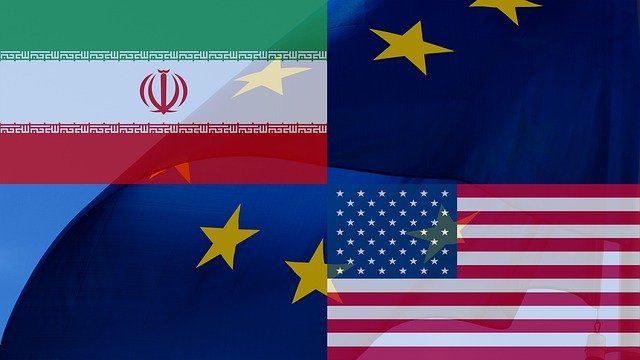Washington Kurdish Institute
By: Giulia Valeria Anderson January 28, 2020
Since the 1979 Iranian Revolution, Europe has tried to maintain relations with the Iranian government, notwithstanding the growing tensions with the United States (US) over the past decade. However, European leaders have had volatile relations with Teheran as well, bringing them to endorse certain agreements rather than others. Nowadays, European countries have advocated against the US-Iranian crisis; for this reason, a historical overview is needed to understand why Europe has taken such a fix position against this growing crisis.
European countries began negotiating bilaterally with Teheran during the early 1990s, leading discussions on human rights, drug trafficking, terrorism, and nuclear proliferation. Generally, the Middle East is a fundamental tassel for European foreign policy, due to their proximity and trade deals. Historically, tensions between Europe and Iran have been unstable, peeking friendly relations to withdrawing international debate floors. In 1992, as European leaders were trying to improve relations with the regime, Iran assassinated three Kurdish-Iranian opposition leaders in Berlin, causing strong international repercussions. What begun, was a four-year-long trial, known as the Mykonos Trail, which saw Iranian intelligence leader Ali Fallahian charged guilty and European countries recall their ambassadors back from Teheran (which had not happened since 1979). However, Europe had no intention to ruin relations in Iran over the Mykonos Trail, especially as the US was, at the time, intensifying tariffs in both Iran and Iraq. As the US introduced new tariffs around 1996, Europe applied various countermeasures trying to keep an open talk-line with the regime. Notwithstanding the efforts of many European countries to negotiate with Iran, especially in matters as nuclear proliferation, with the 2003 US-led invasion of Iraq, relations were cut off. Only several years later, in 2015, European leaders and many non-European countries, signed one of the most important multilateral agreements in European history, the Joint Comprehensive Plan of Action (also known as the Iranian Nuclear Deal). European countries recognized the signing of this deal as fundamental. It not only allowed European countries to tie new relations with the Iranian government, it also gave them an open window to discuss other fundamental aspects concerning European foreign policy, as terrorism and migration.
When President Donald Trump announced the US withdrawal from the Joint Comprehensive Plan of Action and tariffs towards all of the countries trading with Iran, European leaders took a rigid standpoint against the US, as consequences for Europe were high. For example, Italy is the number one partner in Europe for trade with Iran, and it is also its second-largest importer of oil. Plus, since 2011, Europe has been the center of mitigation talks with many North African and Middle Eastern leaders, especially Turkey, Lebanon, Egypt, Iran, Iraq, Tunisia and recently Libya as the tensions with the Haftar government have intensified in what could be soon considered as a proxy war.
This historical background, as stated above, served as explanatory to understand Europe’s recent standpoint concerning the US-Iranian crisis. What is easily understandable is that European countries have always tried to maintain peaceful relations with Iran, not only for their self-preservation but also for their proximity. Moreover, many European governments are part of both the European Union (EU) and the Council of Europe, and so have common laws on human rights and peaceful relations between states that are compulsory to respect for the continent’s security.
Following the killing of General Qassem Suleimani, European leaders have condemned US actions in Iraq, as they caused a heavy escalation with Iran and put them in a position of imminent danger. Immediately after the attacks, EU Foreign Affairs President Josep Borell announced an emergency meeting to decide on a common European approach on the matter, underlining to Euronews that “The EU will do anything in their power to avoid any escalation in the region”. Several hours after the announcement, Italian news outlet La Republica reported US Secretary of State Pompeo blamed European countries of being a disappointment given they condemned the US-led strikes in Iraq.
Even if the EU is not renowned for having a common foreign policy agenda, due to the structure of the EU foresee, all member countries have advocated for an immediate de-escalation of the conflict and a peaceful settlement with Iran. However, Germany has recently announced, as reported by The Guardian, that the US government tried to threaten EU countries imposing +25% tariffs on EU cars unless they would activate a dispute settlement with Iran about nuclear proliferation. The announcement was confirmed on January 16th by the German Defense Minister during a meeting in London with all the EU Defense Ministers whose citizens were killed in the plane incident in Teheran.
The United Kingdom, France, and Germany are those who took an immediate standpoint against the crisis, many have not directly announced their thoughts but support a peace agreement, others as Italy are mainly focused on the Libyan crisis as short-term consequences are threatening. As EU leaders diplomatically arrange a de-escalation, EU citizens are instead worried as the continent has been a territory for many terrorist-led attacks and given its proximity to the Middle East.
Disclaimer: The views, opinions, and positions expressed by authors and contributors do not necessary reflect those of the WKI.

